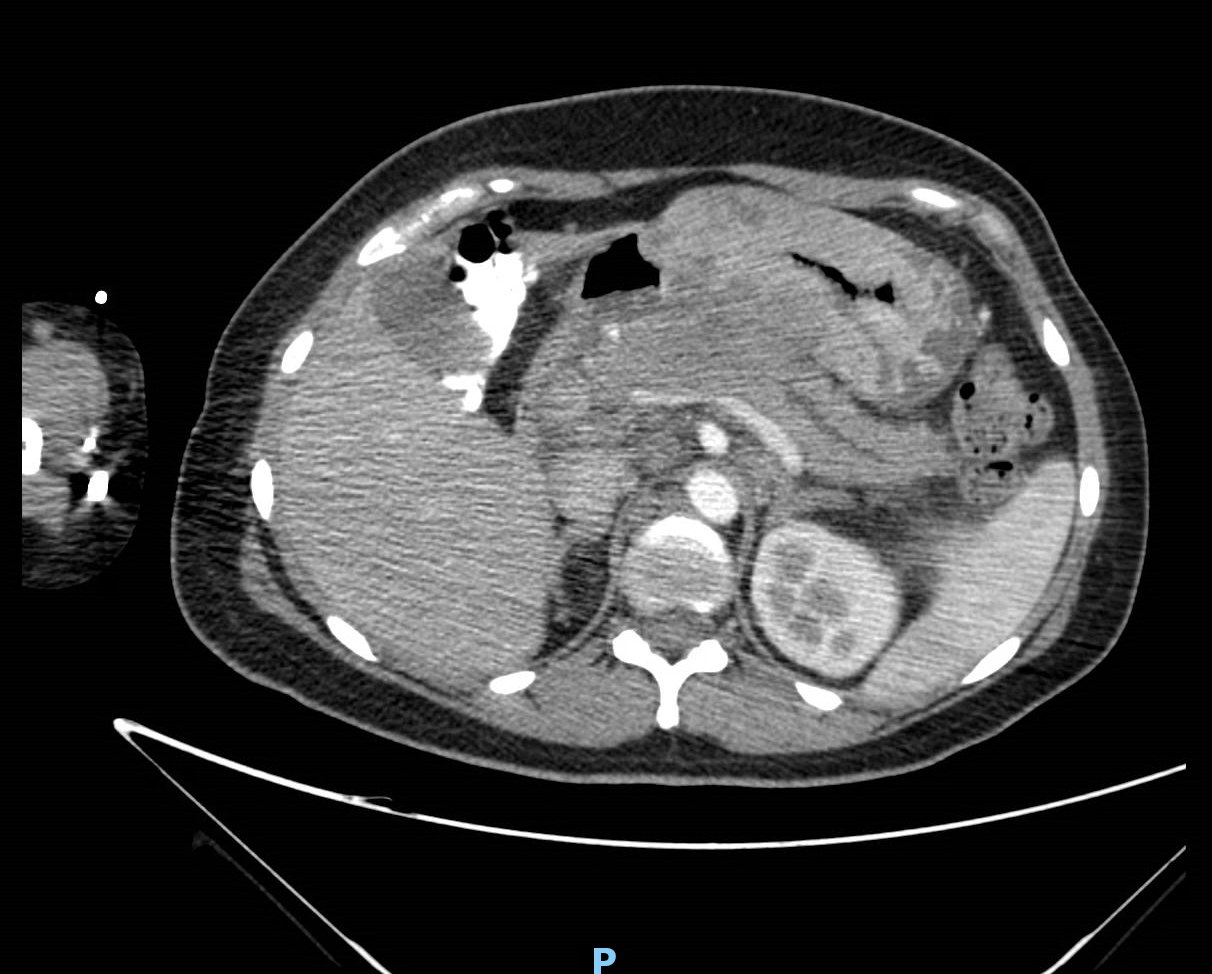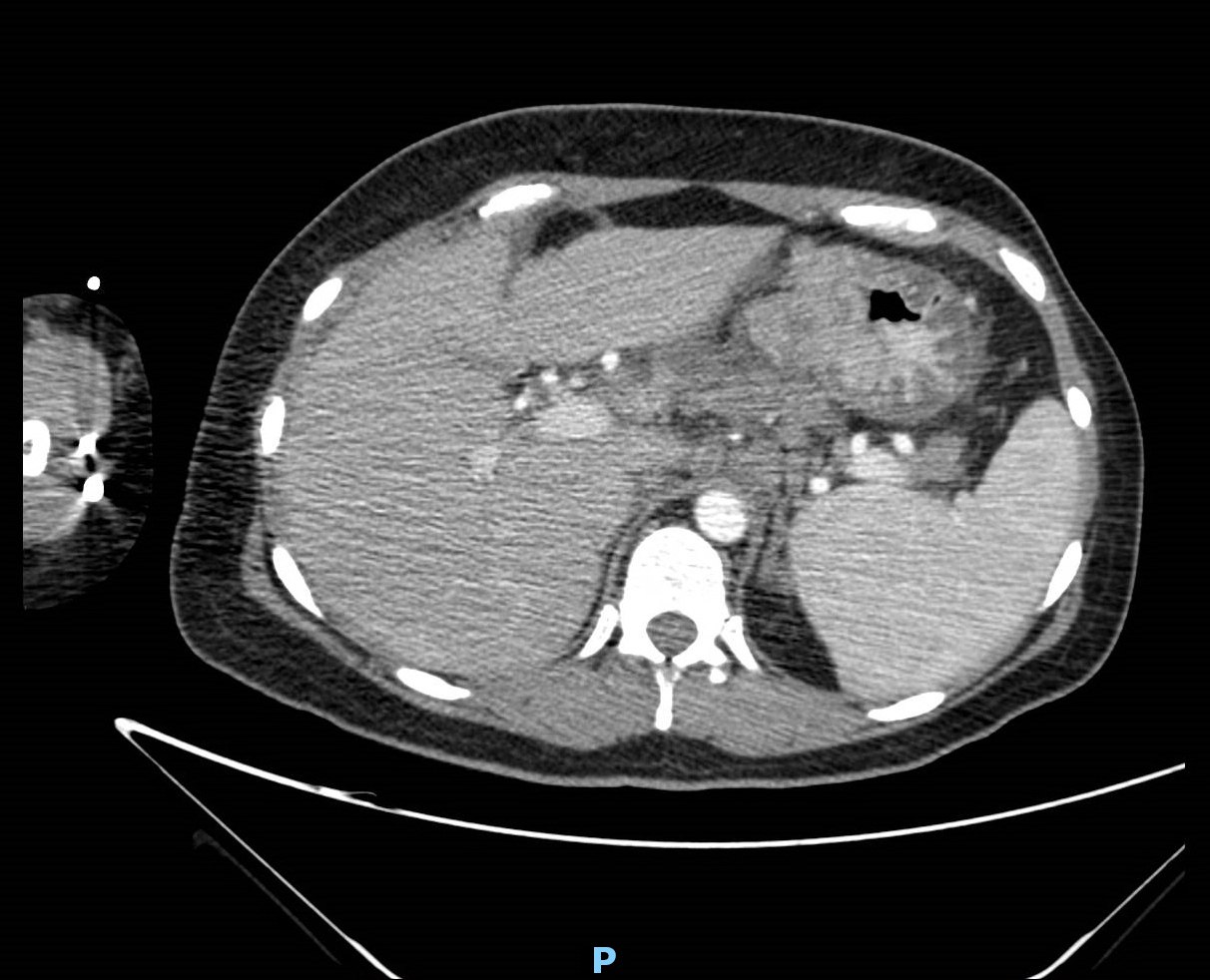Sunday Poster Session
Category: Stomach and Spleen
P2117 - When Common Symptoms Conceal a Killer: A Case of Diffuse Gastric Cancer
Sunday, October 26, 2025
3:30 PM - 7:00 PM PDT
Location: Exhibit Hall

Valeria Rodríguez González, MD (she/her/hers)
University of Puerto Rico, Medical Sciences Campus
San Juan, PR
Presenting Author(s)
Valeria Rodríguez González, MD1, Yashira Medina Román, MD1, Josúe Andino Vega, MD1, Reinaldo Hernandez, MD2, José Roque Torres, MD1, José Colón Marquez, MD1
1University of Puerto Rico, Medical Sciences Campus, San Juan, Puerto Rico; 2University District Hospital, San Juan, Puerto Rico
Introduction: Gastric cancer is the fifth most common malignancy worldwide and the fourth leading cause of cancer-related mortality. Its symptoms are often non-specific, contributing to delayed diagnosis. Diffuse-type is less common subtype of gastric adenocarcinoma but more aggressive, with a significantly worse prognosis compared to the intestinal subtype. We present the case of a young female with a delayed diagnosis of diffuse-type gastric cancer, ultimately resulting in her death.
Case Description/
Methods: A 37-year-old female, G3P1A1 at 12 weeks gestation with no medical history, presented with right lower extremity pain, shortness of breath, epigastric pain, nausea, and unintentional weight loss over three weeks. She had sought care at multiple institutions, where her symptoms were attributed to her pregnancy. On physical examination, she was tachycardic and exhibited palpable lymphadenopathy, epigastric tenderness and impaired flexion of the right lower extremity. Laboratories revealed microcytic hypochromic anemia, elevated inflammatory markers, and increased alkaline phosphatase. Venous Doppler ultrasound revealed deep vein thrombosis of the right popliteal and posterior tibial veins. Chest CT angiogram showed bilateral pulmonary embolism without right heart strain and concentric thickening of the gastric body. The patient was admitted for anticoagulation and further malignancy workup. Abdominopelvic CT revealed heterogeneous concentric thickening of the gastric body with extension into the pancreatic body, findings highly suggestive of gastric neoplasm. After shared decision-making with her obstetrician, the patient elected to terminate the pregnancy to proceed with comprehensive evaluation and treatment. Esophagogastroduodenoscopy confirmed gastric cancer, specifically diffuse-type adenocarcinoma. One week later, during chemotherapy coordination, the patient developed acute respiratory failure. Given the poor prognosis, her family opted for comfort care. The patient received palliative management and subsequently passed away.
Discussion: Despite advances in the diagnosis and management of gastric cancer, the diffuse subtype continues to carry a grim prognosis, particularly in younger patients who often present with advanced disease due to diagnostic delays. This case underscores the critical importance of maintaining a low threshold for further investigation in patients with persistent or unexplained symptoms, regardless of age or pregnancy status, to improve early detection and outcomes.

Figure: Image 1. Heterogeneous concentric thickening of the gastric body with associated enhancement, as well as extensive confluent lymphadenopathy.

Figure: Image 2. Heterogeneous concentric thickening of the gastric body with associated enhancement and extension into the pancreatic body.
Disclosures:
Valeria Rodríguez González indicated no relevant financial relationships.
Yashira Medina Román indicated no relevant financial relationships.
Josúe Andino Vega indicated no relevant financial relationships.
Reinaldo Hernandez indicated no relevant financial relationships.
José Roque Torres indicated no relevant financial relationships.
José Colón Marquez indicated no relevant financial relationships.
Valeria Rodríguez González, MD1, Yashira Medina Román, MD1, Josúe Andino Vega, MD1, Reinaldo Hernandez, MD2, José Roque Torres, MD1, José Colón Marquez, MD1. P2117 - When Common Symptoms Conceal a Killer: A Case of Diffuse Gastric Cancer, ACG 2025 Annual Scientific Meeting Abstracts. Phoenix, AZ: American College of Gastroenterology.
1University of Puerto Rico, Medical Sciences Campus, San Juan, Puerto Rico; 2University District Hospital, San Juan, Puerto Rico
Introduction: Gastric cancer is the fifth most common malignancy worldwide and the fourth leading cause of cancer-related mortality. Its symptoms are often non-specific, contributing to delayed diagnosis. Diffuse-type is less common subtype of gastric adenocarcinoma but more aggressive, with a significantly worse prognosis compared to the intestinal subtype. We present the case of a young female with a delayed diagnosis of diffuse-type gastric cancer, ultimately resulting in her death.
Case Description/
Methods: A 37-year-old female, G3P1A1 at 12 weeks gestation with no medical history, presented with right lower extremity pain, shortness of breath, epigastric pain, nausea, and unintentional weight loss over three weeks. She had sought care at multiple institutions, where her symptoms were attributed to her pregnancy. On physical examination, she was tachycardic and exhibited palpable lymphadenopathy, epigastric tenderness and impaired flexion of the right lower extremity. Laboratories revealed microcytic hypochromic anemia, elevated inflammatory markers, and increased alkaline phosphatase. Venous Doppler ultrasound revealed deep vein thrombosis of the right popliteal and posterior tibial veins. Chest CT angiogram showed bilateral pulmonary embolism without right heart strain and concentric thickening of the gastric body. The patient was admitted for anticoagulation and further malignancy workup. Abdominopelvic CT revealed heterogeneous concentric thickening of the gastric body with extension into the pancreatic body, findings highly suggestive of gastric neoplasm. After shared decision-making with her obstetrician, the patient elected to terminate the pregnancy to proceed with comprehensive evaluation and treatment. Esophagogastroduodenoscopy confirmed gastric cancer, specifically diffuse-type adenocarcinoma. One week later, during chemotherapy coordination, the patient developed acute respiratory failure. Given the poor prognosis, her family opted for comfort care. The patient received palliative management and subsequently passed away.
Discussion: Despite advances in the diagnosis and management of gastric cancer, the diffuse subtype continues to carry a grim prognosis, particularly in younger patients who often present with advanced disease due to diagnostic delays. This case underscores the critical importance of maintaining a low threshold for further investigation in patients with persistent or unexplained symptoms, regardless of age or pregnancy status, to improve early detection and outcomes.

Figure: Image 1. Heterogeneous concentric thickening of the gastric body with associated enhancement, as well as extensive confluent lymphadenopathy.

Figure: Image 2. Heterogeneous concentric thickening of the gastric body with associated enhancement and extension into the pancreatic body.
Disclosures:
Valeria Rodríguez González indicated no relevant financial relationships.
Yashira Medina Román indicated no relevant financial relationships.
Josúe Andino Vega indicated no relevant financial relationships.
Reinaldo Hernandez indicated no relevant financial relationships.
José Roque Torres indicated no relevant financial relationships.
José Colón Marquez indicated no relevant financial relationships.
Valeria Rodríguez González, MD1, Yashira Medina Román, MD1, Josúe Andino Vega, MD1, Reinaldo Hernandez, MD2, José Roque Torres, MD1, José Colón Marquez, MD1. P2117 - When Common Symptoms Conceal a Killer: A Case of Diffuse Gastric Cancer, ACG 2025 Annual Scientific Meeting Abstracts. Phoenix, AZ: American College of Gastroenterology.
